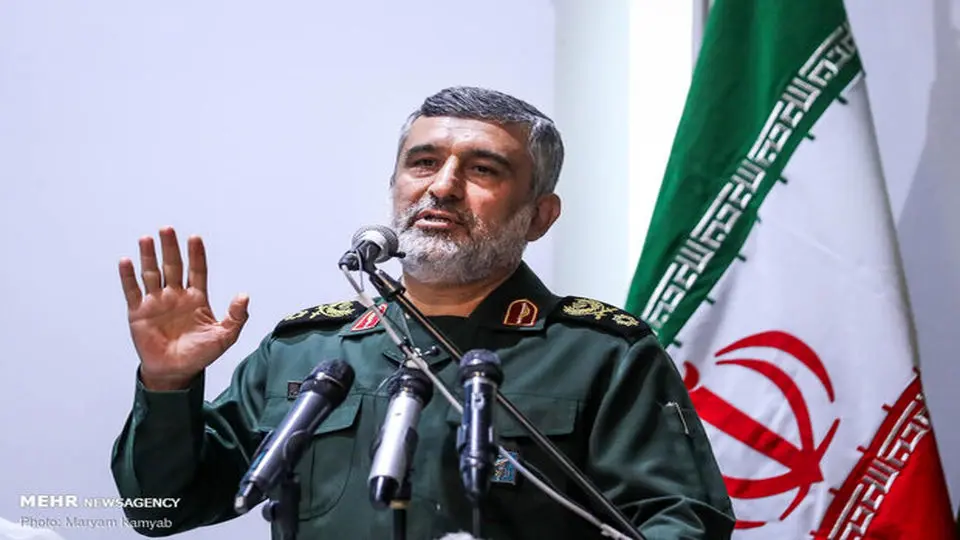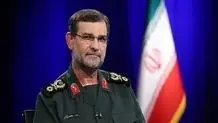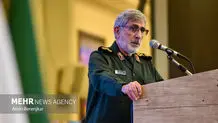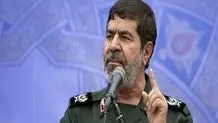IRGC Aerospace Force cmdr. warns Europe against testing Iran
The Commander of the IRGC Aerospace Force advised Europe not to test the Islamic Republic, saying the country has intentionally capped the range of its missiles out of respect for the continent.

MEHR: The Commander of the IRGC Aerospace Force advised Europe not to test the Islamic Republic, saying the country has intentionally capped the range of its missiles out of respect for the continent.
"We are now capable of targeting American aircraft carriers at a 2,000-kilometer (1242-miles) distance," Brigadier General Amir-Ali Hajizadeh said in a televised program on Thursday.
"Of course, we have [voluntarily] kept the distance [that can be reached by our missiles] at 2,000 kilometers out of respect for the Europeans," he said, adding, "We hope [then] that the Europeans [too] would preserve their dignity."
Last month, the European Parliament adopted an amendment calling on the European Union and its member states to include the IRGC on their "terror list," although, the EU's foreign policy chief Josep Borrell and Germany later admitted that there were no legal grounds for taking the move. Major General Hossein Salami, the chief commander of the IRGC, blasted the legislature’s resolution, warning that the Europeans would suffer the consequences of their move.
The bloc has also been slapping more sanctions of its own on Iran over what it calls the country's approach towards foreign-backed riots that erupted in some Iranian cities in September, Press TV reported.
Elsewhere in his remarks, the IRGC commander cautioned that "the United States' benefit lies in creating regional insecurity."
He also considered the US to be the root cause of several global conflicts, including the war in Ukraine and the dispute that the West has been trying to create concerning China's sovereignty over Chinese Taipei.
Returning to the issue of regional stability, Hajizadeh noted that "the region sits on a security fault line," citing the history of the past four decades' conflicts.
"If we fail to be strong, the enemy will bring the war inside Iran," he, therefore, urged, advising, "We should be very careful in order to be able to meet the security needs of our dear nation and country."
The commander, however, hailed that the Corps had always been aiming to render the American war machine ineffective, and had, accordingly, managed to bring all of the US' regional bases within the range of its defensive firepower.
Washington's bases in the region "have [thus] turned into the Americans' weak spot," he said, adding that the IRGC can strike the US outposts "whenever the need arises."
Hajizadeh, meanwhile, addressed the issue of Iran's growing missile power, enumerating the features of the country's hypersonic missile that was manufactured late last year, and announcing a new cruise missile's inclusion in the list of the IRGC’s military hardware.
The hypersonic missile can travel at Mach 12-13 and is capable of exoatmospheric maneuvering, he remarked, saying the projectile is outfitted with an engine that starts within 500 kilometers (310 miles) or a shorter distance of the target's location to enable its maneuverability.
The projectile cannot be destroyed by any of the enemy’s anti-missile systems, he said, adding, "I express confidently that the enemies will not be capable of developing a similar missile over many upcoming decades."
Hajizadeh announced the operationalization of a new long-range cruise missile, codenamed Paveh, that can travel as far as 1,650 kilometers (1,025 miles).
"Our cruise missile with a range of 1,650 kilometers has been added to the missile arsenal of the Islamic Republic of Iran," he said.
He also stated that the country had managed to reduce the weight of its long-range missiles to one-fourth and the time needed for their preparation to a sixth.




